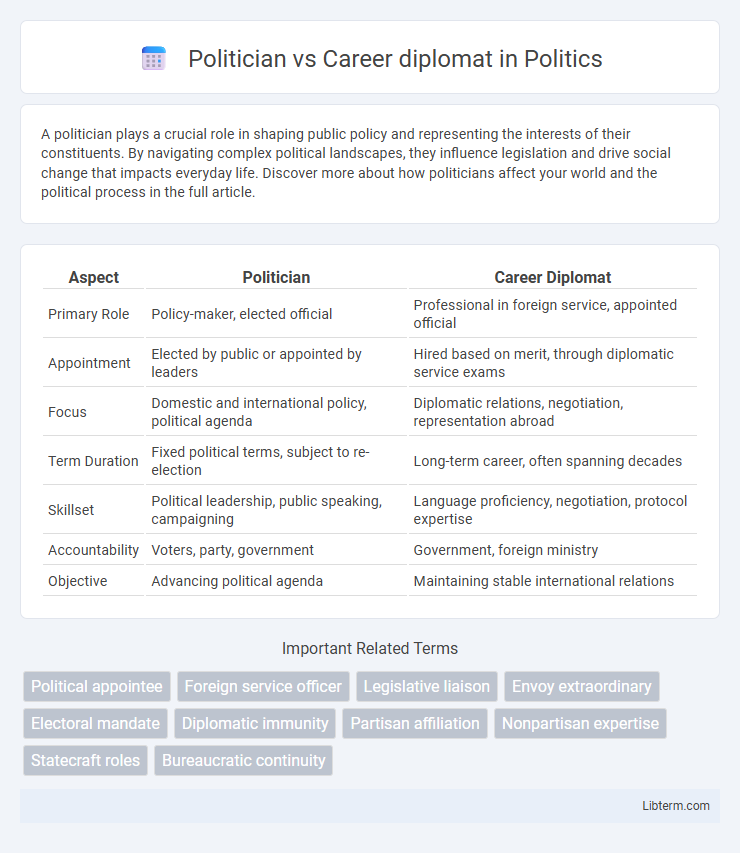A politician plays a crucial role in shaping public policy and representing the interests of their constituents. By navigating complex political landscapes, they influence legislation and drive social change that impacts everyday life. Discover more about how politicians affect your world and the political process in the full article.
Table of Comparison
| Aspect | Politician | Career Diplomat |
|---|---|---|
| Primary Role | Policy-maker, elected official | Professional in foreign service, appointed official |
| Appointment | Elected by public or appointed by leaders | Hired based on merit, through diplomatic service exams |
| Focus | Domestic and international policy, political agenda | Diplomatic relations, negotiation, representation abroad |
| Term Duration | Fixed political terms, subject to re-election | Long-term career, often spanning decades |
| Skillset | Political leadership, public speaking, campaigning | Language proficiency, negotiation, protocol expertise |
| Accountability | Voters, party, government | Government, foreign ministry |
| Objective | Advancing political agenda | Maintaining stable international relations |
Introduction: Defining Politicians and Career Diplomats
Politicians are elected or appointed officials who represent public interests and formulate policies based on political agendas and constituent needs. Career diplomats are professionally trained government officials specializing in international relations and diplomacy, often serving long-term in foreign service roles. The distinction lies in politicians' focus on domestic politics and electoral accountability, while career diplomats emphasize expertise, continuity, and negotiation in global affairs.
Historical Evolution of Political Leadership and Diplomacy
The historical evolution of political leadership and diplomacy reveals a distinct transition from career diplomats, who traditionally managed foreign relations through expertise and long-term service, to politicians increasingly influencing diplomatic decisions with broader policy agendas. Career diplomats, rooted in bureaucratic institutions, emphasized continuity, protocol, and negotiation skills honed over decades, while politicians introduced dynamic, often ideologically driven leadership shaping international strategy. This shift underscores how governance complexity and global interdependence have redefined the interplay between professional diplomacy and political leadership throughout history.
Educational Backgrounds and Professional Training
Politicians often possess diverse educational backgrounds, including degrees in law, political science, or public administration, aligned with skills in leadership and public policy. Career diplomats typically hold specialized degrees in international relations, foreign languages, or economics, alongside rigorous training at diplomatic academies or foreign service institutes. Professional training for diplomats emphasizes negotiation, cultural diplomacy, and protocol, whereas politicians focus more on legislative processes and constituency engagement.
Core Responsibilities and Daily Roles
Politicians primarily shape policy, represent public interests, and make high-level decisions to guide national or regional governance, often balancing party agendas and constituent demands. Career diplomats execute foreign policy by managing diplomatic missions, negotiating agreements, and maintaining international relations through cultural, political, and economic engagement. Daily roles of politicians include attending legislative sessions and public events, while diplomats focus on intelligence gathering, protocol management, and fostering bilateral cooperation.
Approaches to International Negotiation
Politicians often prioritize domestic political agendas and public opinion when approaching international negotiations, seeking tangible short-term gains to satisfy their constituencies. Career diplomats emphasize long-term relationship building, leveraging cultural understanding, protocol, and subtle persuasion to create sustainable agreements. The contrast lies in politicians' focus on visibility and immediate outcomes, whereas diplomats rely on expertise, continuity, and behind-the-scenes maneuvering to achieve durable solutions.
Decision-Making Styles and Authority
Politicians often make decisions based on electoral mandates, public opinion, and party agendas, exercising authority that is politically motivated and subject to frequent shifts. Career diplomats rely on expertise, long-term strategic considerations, and institutional knowledge, making decisions grounded in continuity, protocol, and international norms. Authority in politicians is typically hierarchical and linked to their elected position, while diplomats operate within bureaucratic frameworks emphasizing consensus and negotiation.
Public Perception and Trust Levels
Politicians are often viewed with skepticism due to perceived self-interest and partisan agendas, which can lower public trust. Career diplomats typically benefit from higher public confidence, as they are seen as professional, non-partisan experts dedicated to long-term national interests. Public perception favors career diplomats for their experience and neutrality in sensitive international negotiations.
Crisis Management: Contrasting Strategies
Politicians in crisis management often prioritize swift decision-making and public communication to maintain political support and navigate immediate pressures. Career diplomats emphasize measured, long-term negotiation strategies and multilateral engagement to resolve conflicts while preserving international relationships. This contrast highlights politicians' reactive tactics versus diplomats' proactive, consensus-building approaches in crisis scenarios.
Advantages and Limitations of Each Role
Politicians bring strategic vision and public accountability to diplomacy, leveraging political influence and electoral mandates to shape foreign policy, but may lack the specialized training and continuity that career diplomats possess. Career diplomats offer deep expertise, cultural sensitivity, and institutional knowledge that ensure consistent execution of foreign affairs, though they may be constrained by bureaucratic processes and limited political authority. Balancing political leadership with professional diplomacy enhances effective international relations through the integration of policy direction and skilled negotiation.
Conclusion: Building Effective Global Partnerships
Politicians leverage public influence and policy-making power to rally support for international agreements, while career diplomats utilize deep expertise and negotiation skills to sustain long-term relationships. Effective global partnerships depend on balancing political vision with diplomatic continuity to address complex international challenges. Integrating both approaches enhances trust, facilitates communication, and promotes mutually beneficial outcomes on the global stage.
Politician Infographic

 libterm.com
libterm.com